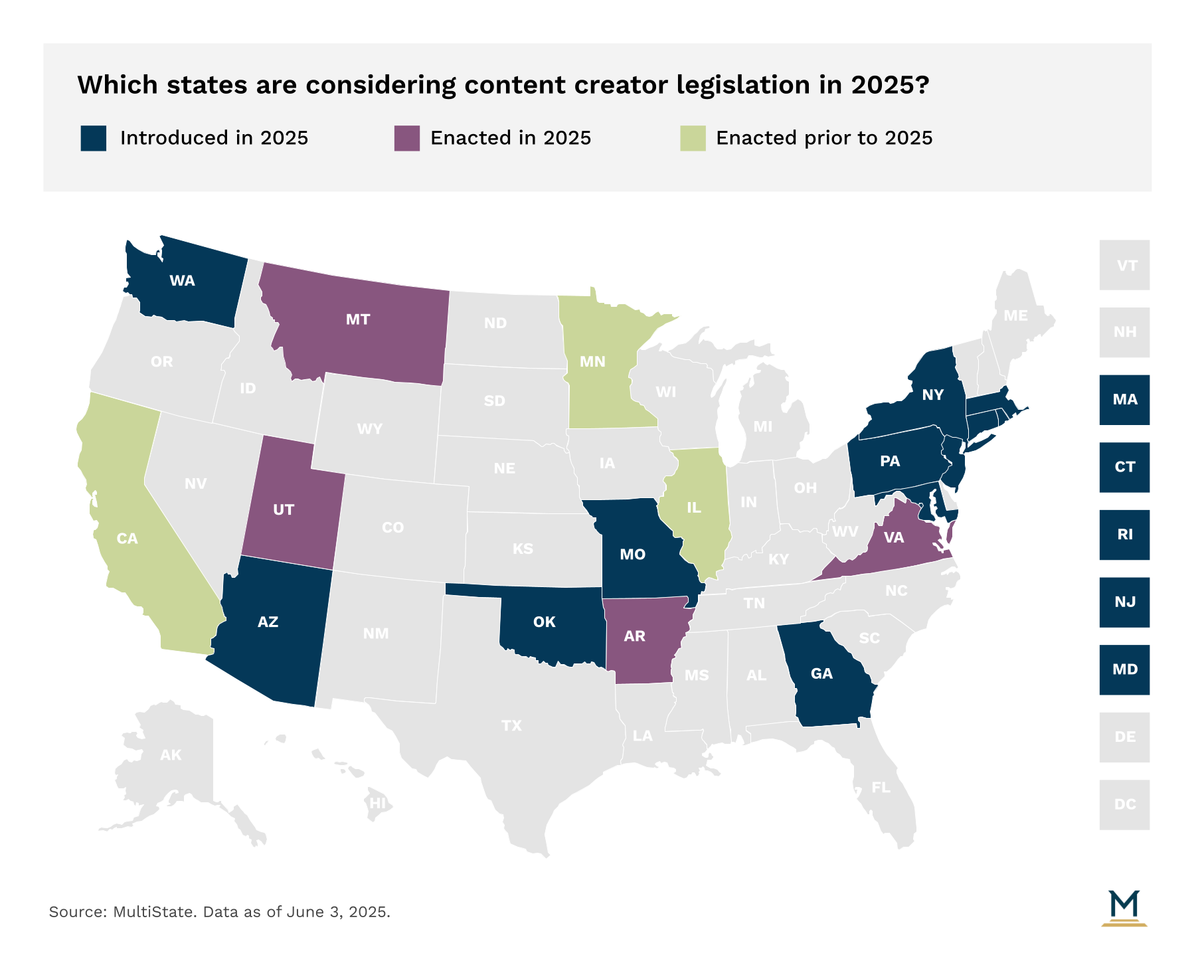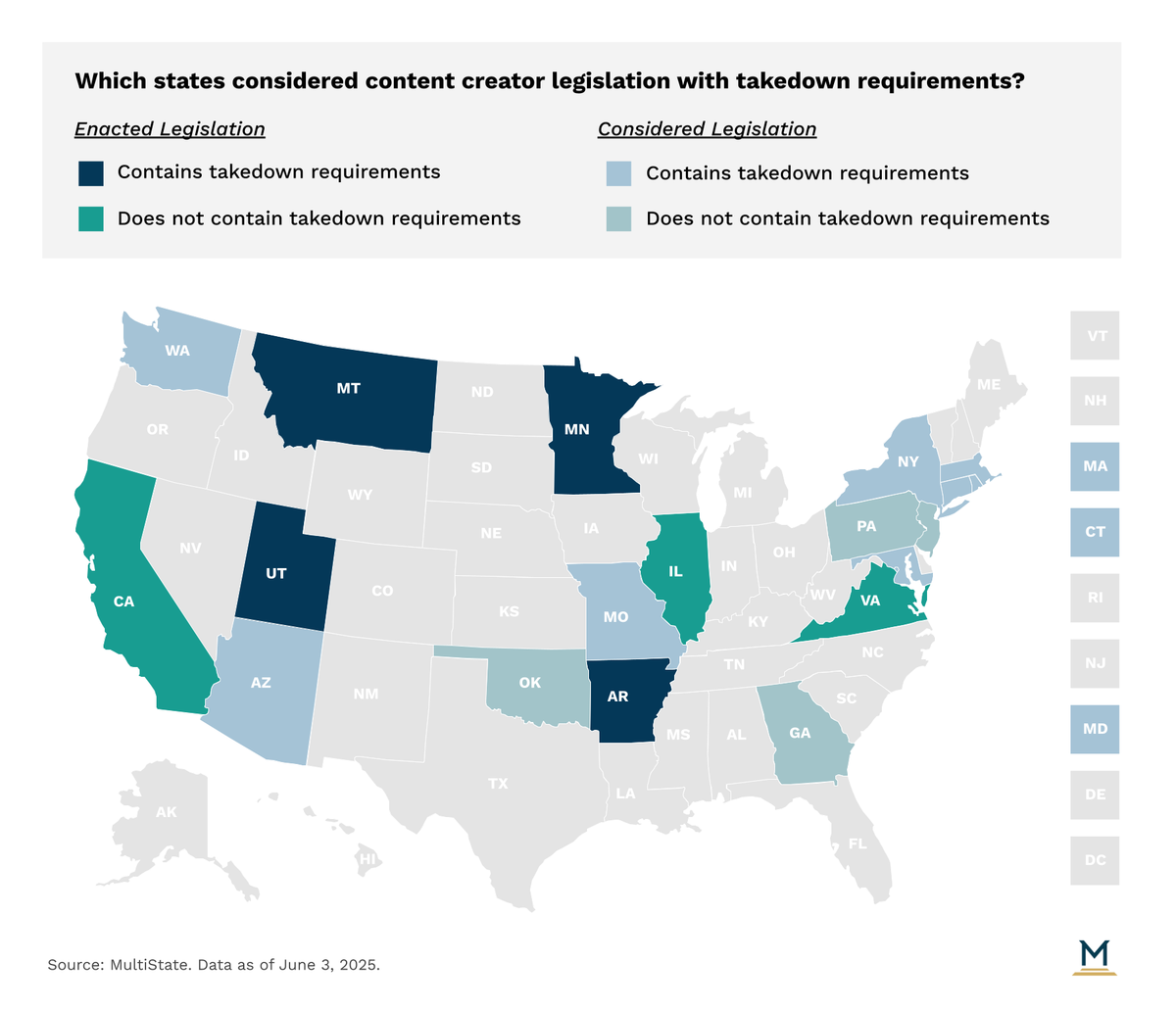
Technology & Privacy
All of the Comprehensive Privacy Laws That Take Effect in 2026
February 4, 2026 | Max Rieper
June 25, 2025 | Kim Miller

Key Takeaways:
This year, lawmakers in many states have turned their attention to legislation addressing concerns in the content creator industry and have considered bills that establish protections for minors who work as content creators.
This year, 16 states have introduced content creator legislation requiring a portion of a minor content creator’s earnings to be placed in a trust account. Some states also considered legislation establishing procedures for individuals to request the deletion of content featuring them as minors once they turn eighteen. This increase in legislative activity follows legislation enacted in Illinois in 2023 (IL SB 1782) as well as Minnesota (MN HF 3488) and California (CA AB 1880) in 2024 that established similar protections for minor content creators.
The increased interest among state lawmakers in establishing protections for minor content creators follows an increasing number of reports from both minors and adults who have not been compensated for their work as content creators.

Utah was the first state to enact content creator legislation this year (UT SB 322). The new Utah law requires the establishment of trust accounts for minor content creators. It also requires that creators remove content featuring individuals as minors upon their request after they turn eighteen. While not the first state to enact content creator legislation, Utah’s new law is the result of a widely publicized case of a family blogger in Utah who, along with her business partner, pleaded guilty to four counts of aggravated child abuse. The adult children in that case have since spoken out about their lack of consent to participate in family vlogging, lack of financial compensation, and expressed concern for the physical and mental well-being of their younger siblings.
The trust accounts required by content creator legislation are based on California’s Coogan Law which was enacted in California in 1939 after child star Jackie Coogan realized that most of the money he had earned as a child actor was gone. At the time, under California law any compensation paid to a minor belonged to their parents. California amended the Coogan Law in 2024 to clarify that it includes minors employed as content creators. New York, Louisiana, Illinois, and New Mexico have similar laws relating to child actors, however, only Illinois has enacted legislation to clarify that they apply to minor content creators while New York is currently considering legislation (NY AB 774/SB 825) that would effectively require Coogan accounts for content creators who are minors.
In addition to requiring trust accounts, many bills addressing minor content creators also establish takedown procedures. These procedures allow minor content creators to request that content featuring them as minors be removed. However, states are taking different approaches to these takedowns.
Utah's Creator-Focused Approach. Utah places the burden on the content creator to remove content featuring a minor.
Arkansas's Split-Responsibility Model. Arkansas, which also enacted content creator legislation this year (AR HB 1975), splits the takedown responsibility between social media platforms, who are required to establish a process for minors to request deletion, and content creators, who are responsible for deleting the content.
Montana's Platform-Centric Requirements. Montana recently enacted legislation (MT HB 392) requiring the online platform (defined in the bill as “A public-facing website, web application, or digital application”) that provided compensation to remove content if requested by the minor who was featured in it. Additionally, Montana's legislation requires that contracts with online platforms must notify the platform when a content creator's minor child appears significantly in video content. This notification informs the platform of the child's future right to request content removal. Similar legislation was considered this year in Rhode Island (RI SB 153) and Washington (WA HB 1820).

These are some of the first state actions to specifically establish protections for content creators that are minors. While the requirements for trust accounts are relatively similar, companies that partner with content creators who either regularly or occasionally feature minors should keep an eye on this emerging area. While there may be existing state and federal laws that address some issues that may arise in the increasingly complicated relationship between content creators, social media platforms, and companies that partner with them, there will likely be more novel issues that arise that will attract interest from state lawmakers.
MultiState’s team is actively identifying and tracking technology issues so that businesses and organizations have the information they need to navigate and effectively engage. If your organization would like to further track this or other related issues, please contact us.

February 4, 2026 | Max Rieper

January 21, 2026 | Abbie Telgenhof

January 15, 2026 | Abbie Telgenhof